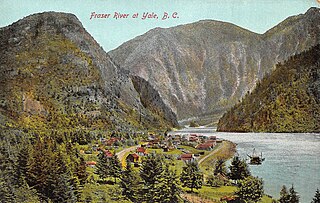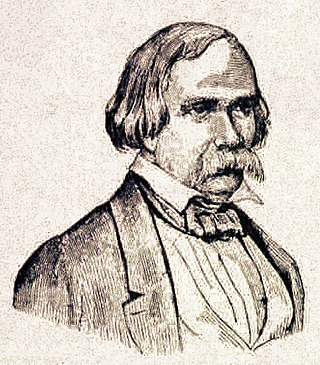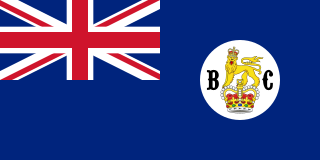
Amor De Cosmos was a Canadian journalist, publisher and politician. He served as the second premier of British Columbia.

Events from the year 1866 in Canada.

Events from the year 1862 in Canada.

Events from the year 1861 in Canada.

Events from the year 1859 in Canada.

The history of British Columbia covers the period from the arrival of Paleo-Indians thousands of years ago to the present day. Prior to European colonization, the lands encompassing present-day British Columbia were inhabited for millennia by a number of First Nations.
New Caledonia was a fur-trading district of the Hudson's Bay Company that comprised the territory of the north-central portions of present-day British Columbia, Canada. Though not a British colony, New Caledonia was part of the British claim to North America. Its administrative centre was Fort St. James. The rest of what is now mainland British Columbia was called the Columbia Department by the British, and the Oregon Country by the Americans. Even before the partition of the Columbia Department by the Oregon Treaty in 1846, New Caledonia was often used to describe anywhere on the mainland not in the Columbia Department, such as Fort Langley in the Fraser Valley.

Yale is an unincorporated town in the Canadian province of British Columbia, which grew in importance during the Fraser Canyon Gold Rush.

Sir James Douglas was a Canadian fur trader and politician who became the first Governor of the Colony of British Columbia. He is often credited as "The Father of British Columbia". He was instrumental to the resettlement of 35 African Americans fleeing a life of racial persecution in San Francisco who arrived in the province aboard the steamship Commodore in what later became known as the Pioneer Committee. In 1863, Douglas was knighted by Queen Victoria for his services to the Crown.
British Columbia gold rushes were important episodes in the history and settlement of European, Canadian and Chinese peoples in western Canada.

The Cariboo Gold Rush was a gold rush in the Colony of British Columbia, which later became the Canadian province of British Columbia. The first gold discovery was made at Hills Bar in 1858, followed by more strikes in 1859 on the Horsefly River, and on Keithley Creek and Antler Creek in 1860. The actual rush did not begin until 1861, when these discoveries were widely publicized. By 1865, following the strikes along Williams Creek, the rush was in full swing.

The Fraser Canyon Gold Rush, began in 1858 after gold was discovered on the Thompson River in British Columbia at its confluence with the Nicoamen River a few miles upstream from the Thompson's confluence with the Fraser River at present-day Lytton. The rush overtook the region around the discovery and was centered on the Fraser Canyon from around Hope and Yale to Pavilion and Fountain, just north of Lillooet.

McGowan's War was a bloodless war that took place in Yale, British Columbia in the fall of 1858. The conflict posed a threat to the newly established British authority on the British Columbia mainland, at the onset of the Fraser Canyon Gold Rush. It was called Ned McGowan's War after one of the conflict's main antagonists.

Frederick Seymour was a colonial administrator. After receiving little education and no inheritance from his father, Seymour was offered a junior appointment in the colonial service by Prince Albert. Seymour held positions in various British colonies from 1842 to 1863, when he returned to England.

The Colony of Vancouver Island, officially known as the Island of Vancouver and its Dependencies, was a Crown colony of British North America from 1849 to 1866, after which it was united with the mainland to form the Colony of British Columbia. The united colony joined Canadian Confederation, thus becoming part of Canada, in 1871. The colony comprised Vancouver Island and the Gulf Islands of the Strait of Georgia.

The Colony of British Columbia was a British Crown Colony that resulted from the amalgamation of the two former colonies, the Colony of Vancouver Island and the mainland Colony of British Columbia. The two former colonies were united in 1866, and the united colony existed until its incorporation into the Canadian Confederation in 1871.

The Colony of British Columbia was a crown colony in British North America from 1858 until 1866 that was founded by Richard Clement Moody, who was selected to 'found a second England on the shores of the Pacific', who was Chief Commissioner of Lands and Works for British Columbia and the first Lieutenant-Governor of British Columbia. Prior to the arrival of Moody's Royal Engineers, Columbia Detachment, the Colony's supreme authority was its Governor James Douglas, who was the Governor of the neighbouring colony of Vancouver Island.

The British Columbia Provincial Police (BCPP) was the provincial police service of British Columbia, Canada, between 1858 and 1950.
The Fraser Canyon War, also known as the Canyon War or the Fraser River War, was an incident between the Nlakaʼpamux people and white miners in the newly declared Colony of British Columbia, which later became part of Canada, in 1858. It occurred during the Fraser Canyon Gold Rush, which brought many white settlers to the Fraser Canyon area. Largely ignored by Canadian historians, it was one of the seminal events of the founding of the colony. Although it ended relatively peacefully, it was a major test of the new administration's control over the goldfields, which were distant and difficult to access from the centre of colonial authority at Victoria in the Colony of Vancouver Island.

The Rock Creek Gold Rush was a gold rush in the Boundary Country region of the Colony of British Columbia. The rush was touched off in 1859 when two US soldiers were driven across the border to escape pursuing Indians and chanced on gold only three miles into British territory, on the banks of the Kettle River where it is met by Rock Creek, and both streams turn east to where in times since developed the city of Grand Forks. The first claim was filed by an Adam Beam in 1860, and the rush was on, composed mostly of Americans and some Chinese, all of whom had come overland from other workings, either at Colville or Oregon or all the way from California.














